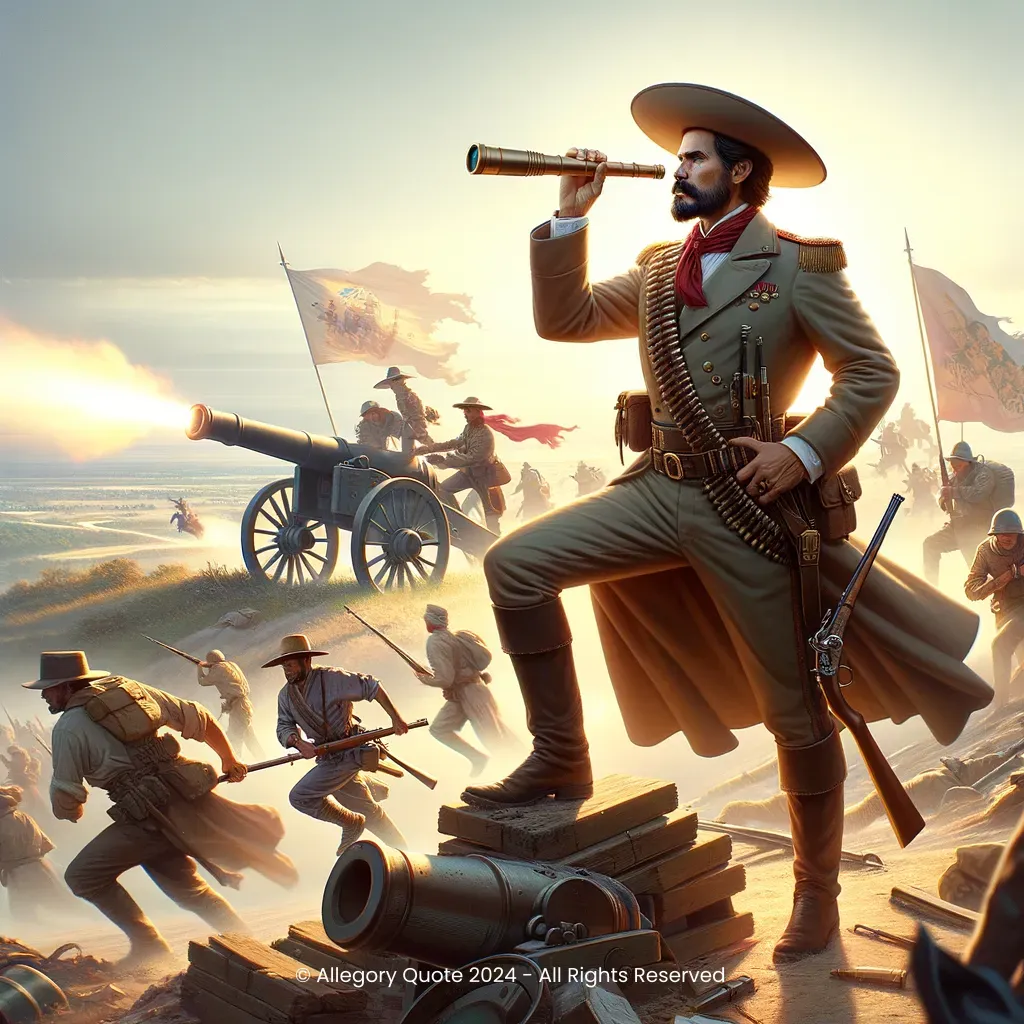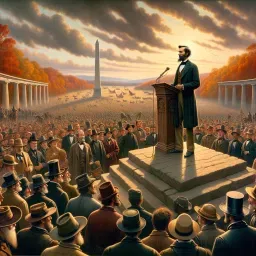”The art of war is simple enough.
Find out where your enemy is. Get at him as soon as you can.
Strike him as hard as you can, and keep moving on“

0
0
0
0
- Meaning
- This phrase underscores a streamlined approach to warfare that focuses on efficiency and effectiveness. The suggestions highlight gathering intelligence on the enemy, promptly engaging them, executing a powerful strike, and then maintaining momentum. In a broader context, it reflects a philosophy of facing challenges head-on, acting swiftly and decisively, and not allowing setbacks to delay progress.
- Allegory
- The central figure of the determined general with a telescope represents the first step: identifying the enemy. The advancing troops illustrate the swift action urged by the phrase. The cannons' blaze symbolizes powerful and decisive strikes, while the transitioning landscape from battle to clear skies signifies progress and the importance of continuous momentum in overcoming obstacles. This representation brings together the strategic, proactive, and relentless nature of the advised approach, resonating with themes of bravery, leadership, and perseverance.
- Applicability
- The principles embedded in this phrase can be applied to many areas of life beyond the battlefield. For example, in business, you can identify market opportunities (your 'enemy'), act quickly to capitalize on these opportunities, execute your plan effectively, and continue to innovate and move forward. It implies being proactive, decisive, and maintaining continuous progress in goals and activities.
- Impact
- This phrase has had a lasting impact on military strategy, leadership principles, and beyond. It reflects a no-nonsense, proactive approach that has influenced various fields, from military tactics to business strategies. It continues to be cited in discussions about leadership, strategy, and overcoming challenges.
- Historical Context
- The historical context of this phrase is the American Civil War, a conflict from 1861 to 1865 that resulted in major social and political changes in the United States. Grant’s military strategies were instrumental in leading the Union Army to victory over the Confederacy. His direct approach to warfare reflected the urgent and intense nature of the conflict during that period.
- Criticisms
- Some criticisms might be that the phrase oversimplifies the complexities of war, potentially overlooking the importance of diplomacy, strategy, and the human cost of conflict. Critics may also argue that such a direct and aggressive approach could lead to unnecessary suffering and destruction. Additionally, in non-military contexts, the phrase could be seen as promoting aggressive business tactics that might neglect ethical considerations or long-term sustainability.
- Variations
- Variations of this phrase and its interpretation can be found in different military doctrines and leadership strategies. Some cultures might emphasize more on planning, strategy, and deception rather than direct attack and constant movement. The phrase can be adapted to fit different contexts, highlighting an approach that values adaptability and persistence tailored to various scenarios.
-

He serves his party best who serves the country best.
-

The goal to strive for is a poor government but a rich people.
-

A public office is a public trust.
-

I have always done my duty. I am ready to die. My only regret is for the friends I leave behind me.
-

I may be president of the United States, but my private life is nobody's damn business.
-

Fourscore and seven years ago our fathers brought forth on this continent, a new nation, conceived in Liberty, and dedicated to the proposition that all men are created equal.
-

Peace and justice are two sides of the same coin.
-

It is easier to do a job right than to explain why you didn't.
-

The world must be made safe for democracy.
-

National honor is national property of the highest value.
No Comments